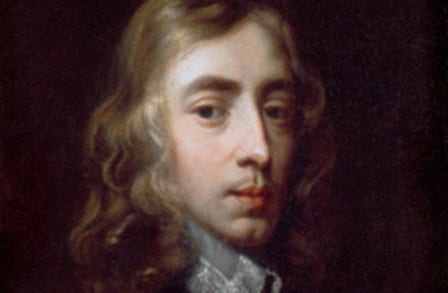John Milton 1608-1674
English is often referred to as ‘the language of Shakespeare and Milton.’ Milton’s poetry has been seen as the most perfect poetic expression in the English language for four centuries.
His most famous poem, the epic Paradise Lost is a high point of English epic poetry. Its story has entered into English and European culture to such an extent that the details of our ideas of heaven and hell and paradise, Adam and Eve, Satan and his legions’ war against God, the arch angel Gabriel and all of those Genesis characters and events, come from Milton’s imagining of them in this poem.
Although so many of our ideas about that story come from Paradise Lost Milton is not read much these days. He is still studied in universities that wish to give their students a grounding in classic English poetry, however.

John Milton portrait
Paradise Lost has all the elements of Greek epic poetry, such as extended metaphors; a hero with cosmic significance (Satan); a setting that encompasses the whole world or, in this case, the universe; battle deeds that go beyond normal acts of warfare; the intervention of supernatural beings in the affairs of humans; and language that is suited to the elevated events and the characters of the epic. Itg is this last characteristic that most distances the modern reader from Milton’s poetry. This extract shows how far distant the poetry is from the modern taste:
The Angel ended, and in Adams Eare
So Charming left his voice, that he a while
Thought him still speaking, still stood fixt to hear;
Then as new wak’t thus gratefully repli’d.
What thanks sufficient, or what recompence
Equal have I to render thee, Divine
Hystorian, who thus largely hast allayd
The thirst I had of knowledge, and voutsaf’t
This friendly condescention to relate
Things else by me unsearchable, now heard
With wonder, but delight, and, as is due,
With glorie attributed to the high
Creator; something yet of doubt remaines,
Which onely thy solution can resolve.
When I behold this goodly Frame, this World
Of Heav’n and Earth consisting, and compute,
Thir magnitudes, this Earth a spot, a graine,
An Atom, with the Firmament compar’d
And all her numberd Starrs, that seem to rowle
Spaces incomprehensible (for such
Thir distance argues and thir swift return
Diurnal) meerly to officiate light
Round this opacous Earth, this punctual spot,
One day and night; in all thir vast survey
Useless besides, reasoning I oft admire,
How Nature wise and frugal could commit
Such disproportions, with superfluous hand
So many nobler Bodies to create,
Greater so manifold to this one use,
For aught appeers, and on thir Orbs impose
Such restless revolution day by day
Repeated, while the sedentarie Earth,
That better might with farr less compass move,
Serv’d by more noble then her self, attaines
Her end without least motion, and receaves,
As Tribute such a sumless journey brought
Of incorporeal speed, her warmth and light.
Milton was a man of letters, and a civil servant. He was politically active – a pamphleteer – a republican and supporter of Oliver Cromwell. Although by the time of his death Paradise Lost was already being spoken of as the greatest poem in the English language he died poor, as a result of his republican views and anti-monarchist involvement.
Read more about England’s top writers >>
Read biographies of the 30 greatest writers ever >>




Leave a Reply
Want to join the discussion?Feel free to contribute!